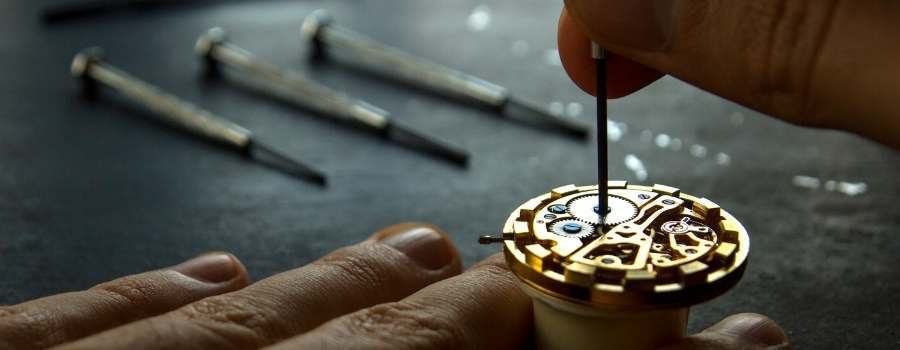
A solar watch is a great way to reduce your reliance on disposable batteries. A solar watch battery can last for years with proper care, and it’s a great way to help the environment!
In this article, I decided to focus on questions related specifically to solar watch batteries, as that seems to be a frequently searched topic that people are trying to troubleshoot. For more general questions about solar watches, check out this other article.
Do Solar-Powered Watches Need A Battery
A solar-powered watch needs to have a battery to store the electrical energy that has been converted from light by the solar cells. This battery can be either a rechargeable or non-rechargeable battery such as a lithium-ion, nickel metal hydride, or alkaline.
Some manufacturers, like Citizen, claim their solar watches don’t use batteries. They use a series of solar cells that are rechargeable and store a charge for long-term use. They call it their “light-powered technology.”
However, they just defined what a battery is…Even in their user manual, they refer to these “solar cells” as “secondary rechargeable batteries.” Ultimately, if it stores energy…which is an essential function in a solar watch…it’s a battery, and all solar watches need one.
How Long Does A Solar Watch Battery Last
Solar watch batteries are rated to last around 10 years however, many can last for several decades depending on usage. Even if you overly strain the watch’s functions, you should still get upwards of 9 years out of it.
Batteries are rated in cycles which means the battery can be charged and discharged a certain amount of times before it fails. The more cycles the battery has gone through, the shorter its lifespan will be. A battery is considered degraded once it reaches a cycle rate of 70%.
Of course, you can keep the watch as is and continue to recharge it for decades. It will never hold that robust level of charge that it once did, but it should still give you a full day of activity.
Ten years is a long time for a battery to last, especially when you consider some watches have functionality above just telling time. In addition to their longevity, there are some other benefits to wearing a solar-powered timepiece.
- No Need to Replace Batteries for A Decade
- Very Little Maintenance Required
- Very Affordable
- Environmentally Friendly
- Almost Always Charging
Whether you’re inside or outside your solar watch will always be picking up a charge. The few minutes you spend walking to and from your car or hanging out in outside for lunch is all quality charging time. Plus, you’ll pick up some charge from inside your home or office too.
Since many solar watches are so affordable, you’re getting a lot of short-term and long-term value when you purchase one. Low prices encompass the short-term benefits while the sheer longevity of the battery and watch offers all of the benefits of an affordable, long-term value.

Can You Replace A Solar Watch Battery
Most solar watches have replaceable batteries, but the odds of having to get the battery changed out are very low. With proper care and maintenance, solar watch batteries are designed to last for nearly a lifetime.
The problem is, outside of something that would necessitate a battery change, it’s not something that you’re going to be able to do on your own. At least not ordinarily. It’s a lot more complicated than removing the backing on a standard watch.
Attempting to do a battery swap yourself could prove problematic since the intricate parts inside solar watches are incredibly delicate…particularly their small cells. Even if you successfully reassemble your watch, it may not work afterward.
To make matters even more difficult, the tiniest electrostatic shock can destroy a watch’s internal components without leaving any trace on its external body. You wouldn’t be able to detect this damage until you reassemble it.
Experienced watchmakers will have all the necessary tools and protective gear to expeditiously take apart and reassemble your timepiece with a new battery installed, making sure that there is no trace of ever opening it.
What Is The Difference Between A Quartz And Solar Watch Battery
Quartz watches are powered entirely by batteries, whereas solar models leverage a unique mechanism to power them. The battery of solar-powered watches is charged through solar light exposure.
The main difference between quartz watch batteries and solar watch batteries is in the source of their energy.…but there are a few others:
- Quartz Watch Batteries Don’t Last As Long
- Solar Watch Batteries Don’t Need To Be Disposed Of Nearly As Often
Generally, a standard quartz watch battery will run for two to three years before needing replacement. Solar-powered watches however can last an impressive ten or more years without any additional maintenance required.
Solar watches are also more environmentally friendly since they do not rely on disposable batteries that can often contain harmful toxins.
What Kind Of Battery Does A Solar Watch Use
Solar watches use ultra-light rechargeable batteries. These are usually either lithium-ion or nickel-metal hydride, depending on the model of the watch.
Lithium-ion batteries tend to be more expensive than nickel-metal hydride options and provide a longer battery life. However, they require more frequent charging in lower light conditions, making them less suitable for those who live in areas with limited access to sunlight.
Solar watches also have a capacitor that stores the energy from solar light and converts it into electrical energy that powers the watch. This is what allows them to store power even when not exposed to direct sunlight.
Lastly, some models utilize two batteries…one to power the watch and a second to back up the timekeeping function. This ensures that your timepiece will keep running even when not exposed to light for an extended period.

Can I Use Any Light To Charge My Solar Watch Battery
Generally, LED lights can be used to charge a solar watch, but it will take longer than simply exposing it to sunlight, especially if you’re using only one LED light.
Ideally, a solar watch should be exposed to direct sunlight for approximately 2-3 hours to get a full charge. LEDs are not as strong or intense as the sun, so it will take considerably longer for your watch to charge fully, up to 12-24 hours.
LEDs can also produce more heat than natural light sources like the sun, which can cause damage to your watch over time so it’s best to avoid using them. If you must use an LED light, consider dimming the bulbs or switching them off for periods to protect your watch from overheating.
Will Leaving My Solar Watch In The Sun Damage The Battery
Leaving your solar watch in direct sunlight for short periods of time won’t damage it in fact, that’s the best way to fully charge your solar watch. However, direct sunlight for several hours could potentially overheat your watch.
Having your solar watch overheat means that there is a risk of damaging the internal components, so it’s best to keep an eye on your watch if you’re going to be leaving it in the sun for an extended period of time.
In general, it’s best to keep your solar watch out of the sun when you’re not wearing it. This will help to ensure that the battery lasts as long as possible.
Can Solar-Powered Watch Batteries Leak
Modern solar watch batteries are made of durable materials that make them nearly impervious to leaking acid. They typically have protective casings that further reduce the risk of leakage.
However, if your solar watch is overcharged or left exposed to intense sunlight for too long, it’s possible that the battery could become damaged and start leaking.
If you notice any signs of leaking acid, such as discoloration or a burning smell, it’s important to take the watch in for repair immediately. Leaking acid can cause irreversible damage not only to your watch but also to your skin and other objects that come into contact with it.
So as long as you take proper care of your solar watch, you should not have to worry about battery leakage. Make sure you charge it properly and keep it away from intense light sources when not in use.
Final Thoughts
Solar watches are a great way to reduce your reliance on disposable batteries, and they’re perfect for people who want to be environmentally friendly.
While you may need to take your solar watch to a professional in order to change the battery, it’s definitely worth it in the long run. And with careful use, your solar watch battery should last for years…perhaps even decades!
